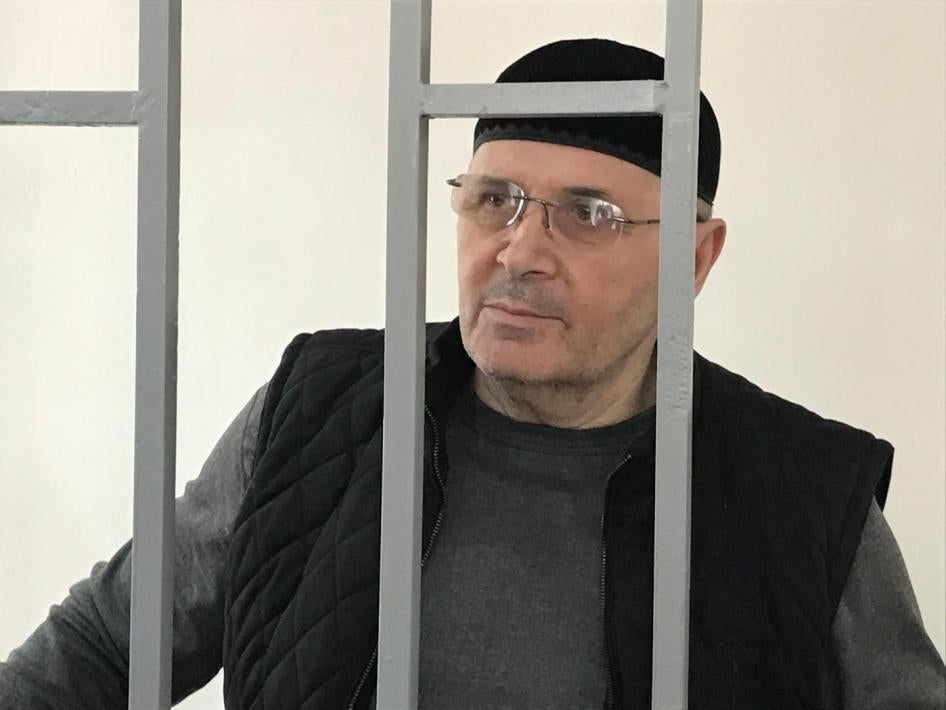After 14 months behind bars and a trial that’s dragged out for eight months, Chechen human rights activist Oyub Titiyev gave his closing statement on Monday.
Titiyev has headed the office of the Russian human rights group Memorial in Grozny for nine years, collecting harrowing evidence of abuses and injustices committed by Chechen authorities.
He’s done this at great peril. For over a decade, local authorities and their proxies have hounded, detained, beaten and vilified human rights defenders and even torched their offices. His Memorial colleague, Natalya Estimirova, was kidnapped and murdered in 2009.
The prosecution is now seeking a four-year prison sentence against Titiyev on bogus marijuana possession charges.
After the prosecution and defense delivered their closing arguments, I watched in the courtroom as Titiyev spoke in a calm, restrained and dignified tone. But he did not try to conceal his contempt for the lies the prosecution had strung together in their case against him.
“You don’t need a law degree to see the absurdity of this case,” he said.
What you need, though, is an affinity for make-believe stories with no basis in reality.
On the morning of Jan. 9, 2018, Titiyev said that law enforcement stopped him while he was driving to work. They planted a bag of marijuana in his car and took him to the police station. They threatened to harm his family if he didn’t confess to drug possession. He refused. When he noted that the officers had no witnesses to the “discovered” marijuana, the local police took him together with his car back to the place where they had stopped him earlier.
According to the official version, Titiyev was stopped only during this second incident, after police saw allegedly saw him driving with high beams on. Magically, in the car, they claimed to have seen something “suspicious” beneath a rubber mat under the front seat. This time, though, police made sure that “witnesses” were quickly summoned to the roadside.
Surveillance videos from more than a dozen security cameras at and near the police station where Titiyev was taken would have shown that he was brought to the station not once, but twice — and would have wrecked the prosecution’s story. In an impossible coincidence, all the cameras were temporarily out of order between 9 a.m. and 1 p.m. that day.
Titiyev also had three phones and a tablet with him when police stopped him, any one of which could have tracked Titiyev’s movement back and forth to the police station, but they too disappeared. The police deny taking them.
Perhaps the best example of the case’s farcical nature is the account of the witness who allegedly saw Titiyev smoking a joint on a Grozny street in November 2017. In court, the witness testified that on Jan. 9, 2018, a man next to him in a taxi van was reading an article about someone who had just been arrested for marijuana possession. The witness said he recognized the man in the photo — Titiyev — as the man he had seen smoking a joint in the street two months earlier.
Later on Jan. 9, the witness happened to run into a police investigator in Grozny and told him about this incredible coincidence. That evening, the same investigator ran into a detective from the town where Titiyev was arrested and told him what he had heard earlier.
Yes, Chechnya can feel like a small place where everyone knows each other. But you have to believe in unicorns to believe this chain of events. Yet that’s how police found their “witness” — who has two prior drug convictions but somehow never served prison time, unheard of in Chechnya.
Titiyev’s lawyers summarized these and many other examples of the improbable stories that the prosecution offered as evidence. But throughout the trial, the defense’s words seem to have fallen on the court’s deaf ears.
Sadly, none of this should come as a surprise in Chechnya today. The republic’s leader, Ramzan Kadyrov, has total control over all public life, brooks no dissent, and has eviscerated Chechnya’s human rights movement. After Titiyev’s arrest, Kadyrov publicly called him a drug addict and a traitor working for an “enemy” organization. As my colleague wrote last month, no local court would dare acquit him, no matter how blatant the fabrication.
During his closing statement, Titiyev told a joke about a journalist who interviewed a man at the Wailing Wall in Jerusalem. The man said he hoped his prayers would improve people’s lives, and that he’d been doing it every day for 40 years. When the journalist asked him what it feels like, he replied: “Like I’ve been talking to a wall.”
Soon, we’ll learn whether Titiyev and his lawyers have been talking to walls. His verdict will be read on March 18.










